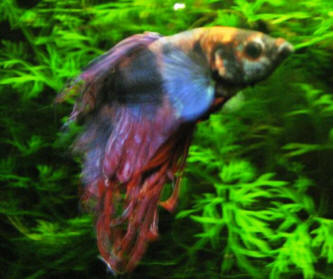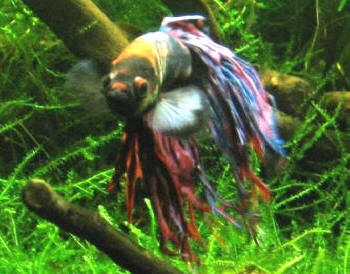|
FAQs on Betta
Genetic Disease/Health
Related Articles:
Anabantoids/Gouramis &
Relatives, Betta
splendens/Siamese Fighting Fish,
Betta Systems,
Betta Diseases,
Improved
(Better?) Products for Bettas!,
Related FAQs:
Betta Disease 1,
Betta Disease 2,
Betta Disease 3,
Betta Disease 4,
Betta Disease 5,
Betta Disease 6,
Betta Disease 7,
Betta Disease 8,
Betta Disease 9 ,
Betta Disease 10 ,
Betta Disease 11 ,
Betta Disease 12 ,
Betta Disease 13 ,
Betta Disease 14 ,
Betta Disease 15 ,
Betta Disease 16 ,
Betta Disease 17 ,
Betta Disease 18,
Betta Disease 19,
Betta Disease 20,
Betta Disease 21,
Betta Health 22,
Betta Health 23,
Betta Health 24,
Betta Health 25,
Betta Health 26, Betta Disease
Causes/Etiologies: Determining/Diagnosing,
Environmental (By far the largest cat.),
Nutritional,
Viral/Cancer,
Infectious (Bacterial, Fungal) ,
Parasitic:
Ich/White Spot,
Velvet;
Senescence/Old Age,
Cures/Curatives/Treatments,
|

|
 |
New
Print and
eBook on Amazon
Betta Success
Doing what it takes to keep Bettas healthy long-term
by Robert (Bob) Fenner
|
Problems with "dragon scale" Bettas
9/21/18
Hello:
<Hello.>
We have Dragon Scale Bettas at the LFS here. They tend to have thick
scales that tend to be shiny although I am seeing this less and less.
Also the scales apparently can grow over one eye or both eyes blinding
the fish completely.
<Indeed, just what the hobby needs -- another fish that's crippled by
the mutant genes we've bred into it.>
The one I saw today had one good eye and one seemed clouded or maybe it
was a thin scale over the eye. Does anyone know about these Bettas?
<The International Betta Congress are probably the best people for
information about new Betta breeds.>
As in it maybe being a case of trying to breed for characteristics that
backfires when it leaves the fish blind?
<Yes; so far as I can ascertain, all dragon scale Bettas are handicapped
to some degree. Some fry die very early on, others survive for months or
a year or two, but they don't seem to have the same 3-4 year lifespan of
typical fancy Bettas. Even those that live some years will usually end
up blind.>
Also it seems that when Bettas are inbred for interesting
characteristics they seem to lose their feisty nature and tend to be
slower and timid, not the usual "natural" Betta wanting a fight with
another Betta. Thank you
<Cheers, Neale.>
|
experienced keeper - Betta changing colours and swollen
mouth - no visible illness (RMF???) 6/29/13
Dear WWM crew,
Firstly, love your site and your expertise, thank you on behalf of
aquarists everywhere.
<Thanks for the kind words.>
On to the issue: I've been in the hobby a long time, lived on forums,
run a small maintenance business, kept everything for planted, Walstad,
brackish, to marine, volunteered at a zoo, am a biology nerd etc etc and
am generally able to diagnose most common illnesses, but I've been
thrown a curve by my own pet Betta. I've scoured literature/forums and
am still scratching my head, so maybe the guru's of wwm can help!
When i bought him for my established, planted 5g, he was a blue
Crowntail with a red streak or two one the fins. After colouring up,
there was more red, but colouring up with unexpected colours/patterns is
not unusual ime. After some time, he split a fin mildly, and though it
healed very well, the colour was different - a pale pink to ruddy red
similar to that in pale red Bettas. This spread to his whole body in a
'wave', with his usual blue (black on the face) returning after. Now, he
keeps changing colour in patches all over, eyes, fins, body, everywhere.
He has no sign off parasites, no slime, no swelling, no fungus, eats
very well, and is active as ever, and the colours are actually quite
vibrant. It has been happing for about 8 months now. Once,
his left fin went clear with a boarder of blue, like some of the fancier
Betta colour patterns I've seen.
<I agree; his colour patterns are very unusual.>
The only other item of interest is his mouth. He always had a bit
of a 'fat-lip', but now the lower lip is protruding out quite far. It is
stable (i.e., not getting worse), and he can eat normally. But it looks
unusual. please see pic attached.
I've had him about 18months.
Tank parameters:
-5gal/18L
-temp: 25 C / 77F
-ammonia & nitrite: 0ppm
-nitrate: under 5ppm
-pH: 7.4
-GH: 4
- KH: 3 (i buffer it up with potassium bicarb as my normal KH is very
low and the tank is heavily planted, and then reduce the pH down a bit
with SeaChem Acid Buffer
- i monitor parameters before and after water changes to ensure no
fluctuations)
-heavily planted
-water change: 30% weekly with Prime.
-Diet: NLS pellet staple, mix it up every few days with Hikari Bio-Gold,
Spirulina flakes, 1/2 a skinned pea weekly, treats of thawed Mysis
shrimp, brine shrimp, white worm and a fast day every week or so.
Yes, the tank is filtered and heated. Small internal filter behind the
plants and a stick heater set to 25 C/ 77F.
The only idea that has come up is that he may be reverting to the more
dominant 'red' base pigmentation in the scales following his injury,
with the blue kicking back in later. Doesn't explain why it keeps
happening. Or, he's been poorly bred and all this is the result of
that. Still, unsure if the mouth issue is a co-morbidity of
something related to the skin condition, or a separate matter.
Thank you for your wisdom on this issue.
Kind regards
Lea
<Do think the fins look a bit ragged, more so than usual, so would be
looking out for Finrot. Would definitely review filtration… possibly
water current too strong; always favour air-powered filters, e.g.,
sponges, over internal canisters, hang-on-the-backs, etc so far as
Bettas are concerned. Colour changing is very odd, not aware of this
being "normal" for Bettas but does happen in some fish for a variety of
reasons… may be genetic, may be dietary, may be environmental, may be
evidence of nerve damage. Can't really say what's going on here. The
mouth is, again, odd, but not obviously something like Mouth Fungus
(Columnaris) or Lymphocystis. I would tend to not medicate or treat
beyond observation and ensuring good diet and water quality. Sorry not
to be able to offer any concrete diagnosis. Cheers, Neale.>
<<The darkness, mélange/mix of coloring... something "neural" damage,
genetic going on here... But what etiology, root cause/s? The alluded to
damage? The "fat lip" is nothing to be concerned re... and nothing to
change, treat for here. RMF>>
|

 |
|
Re: experienced keeper - Betta changing colours and swollen
mouth - no visible illness (RMF???) 6/29/13
<<The darkness, mélange/mix of coloring... something "neural" damage,
genetic going on here... But what etiology, root cause/s? The alluded to
damage? The "fat lip" is nothing to be concerned re... and nothing to
change, treat for here. RMF>>
<<<Thank you Bob for this second opinion. Cheers, Neale.>>>
Re: experienced keeper - Betta changing colours and swollen mouth - no
visible illness (RMF???) 6/29/13
Hello WWM crew.
I think i solved the problem with the colour - see this example:
http://bettysplendens.com/articles/page.imp?articleid=1114
It is exactly as described by the effect of 'jumping genes', seen in
some marble Bettas, as well shown in the link article (extreme
case). My boy looks like the first few stages. As my degrees are
in genetics and I've worked in this industry, i understand how this would
produce this effect well and how it can constantly change. Certainly
odd looking though!
<I'll say!>
Funnily enough, just found this info tonight. Check the link, great
new info. This is exactly how he looks, though seems mines not
finished the colour change, or he keeps reverting back. Will be
chatting to a Betta genetics whizz for more info on how it is practically
expressed.
<Definitely an interesting article.>
On the filter - thank you for the idea, but yes i understand flow issues and
Bettas, it is on very low setting with the outflow blowing into a wall to
lessen it further, and to act like a cheat's 'lily pipe' as it directs water
current around the back of tank gently for the plants. He sits on it
often and swims though the flow with ease, so i doubt it's stress.
<Cool.>
His fins have always been ragged looking - never the same length. It looks
worse when he's not displaying too. It's half the reason i chose him.
I wanted a 'flawed' Betta for this wild tank layout and also felt a little
sorry for him not being as beautiful as his companions. No sign of
fin-rot though he has had a split a fin once or twice. I just maintain
excellent water quality and diet and he's quite robust, heals quickly.
Does make me think he may be poorly bred though that his fins never 'even
out'.
<May well be.>
The lip is still a concern, he cant properly close his mouth and it seems as
if it's been pushed inside out a little (apologies i cannot seem to get a
better pic). There is a lump in the centre that looks even and normal, but
should be on the inside. But again, as it's stable and he can eat well, then
i suppose no reason to rush out and treat.
<Quite so. Do review Lymphocystis and Columnaris so you have two possible
things to look out for, but medication at this point may not be particularly
useful. Might be worth writing to/on one of the Betta-specific forums to see
if anyone can share similar experiences with you.>
Thank you again all
Lea
<Most welcome, Neale.>
|
 |
New
Print and
eBook on Amazon
Betta Success
Doing what it takes to keep Bettas healthy long-term
by Robert (Bob) Fenner
|
|
|

